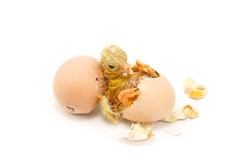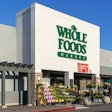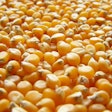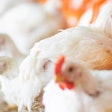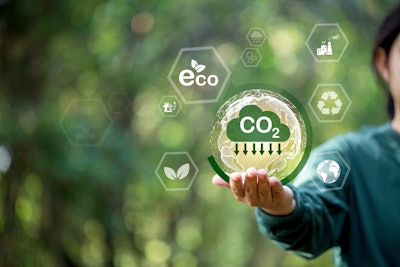
The animal feed industry’s multi-faceted approach to meet its sustainability goals for 2030 includes reducing greenhouse gas (GHG) emissions, conducting life-cycle assessments (LCAs) and collaborating with partners in the supply chain.
Feed Strategy recently asked U.S.-based Alltech and Netherlands-based ForFarmers about their sustainability initiatives and goals, and how they are working to achieve them.
Carbon emissions reduction
Alltech has committed to reducing its Scope 1 and 2 GHG emissions by 42% and Scope 3 GHG emissions by 25% from baseline measurements in 2021. These targets follow the reduction trajectory recommended by the Intergovernmental Panel on Climate Change.
Scope 1 emissions include from company activities such as the use of fossil fuels at a company’s facilities; Scope 2 includes indirect emissions from electricity use; Scope 3 emissions are all other indirect emissions associated with the value chain, from raw materials to the use of the company’s products.
“Setting and pursuing these targets demonstrates our commitment to a world of abundance for future generations,” said Alltech President and CEO Dr. Mark Lyons.
Alltech said it invested US$4.5 million in efficiency projects in 2022. These projects reduced its emissions by 7,600 metric tons of carbon dioxide equivalent (CO2e) per year.
“We conducted 11 site-specific energy audits and efficiency improvement plans in 2022, and we completed 47 energy efficiency project feasibility studies. There are many opportunities to further reduce our emissions through energy conservation practices, such as upgrading to energy-efficient equipment, process efficiencies and other innovative solutions,” Alltech said.
Transitioning to renewable energy is another way Alltech aims to lower its emissions.
“We recognize the importance of reducing our reliance on fossil fuels and are exploring both on-site and off-site options for solar and wind power. Transitioning to renewable electricity sources has multiple benefits, including reducing GHG emissions, improving energy security and promoting a more sustainable energy system,” it said.
ForFarmers said it aims to reduce Scope 3 GHG emissions by 30% in 2030 compared with 2020. In its 2022 annual report, it said its Scope 1 and 2 GHG emissions fell by 40% in 2022 compared with the previous year.
“This substantial drop is linked to an improvement in the carbon conversion factors, which provide a more accurate picture of the share of renewable and nuclear energy in the electricity that we purchase from the grid,” it said.
ForFarmers said it uses an “energy saving matrix” comprising more than 150 projects – many of which relate to optimizing or replacing existing equipment – to reduce its energy and diesel consumption.
Alignment with UN Sustainable Development Goals
Alltech first committed to the United Nations’ Sustainable Development Goals (SDGs) in 2019, identifying nine of the 17 goals as closely aligning with its business: SDG 2 (zero hunger), SDG 3 (good health and well-being), SDG 4 (quality education), SDG 5 (gender equality), SDG 8 (decent work and economic growth), SDG 13 (climate action), SDG 14 (life below water), SDG 15 (life on land) and SGD 17 (partnerships for the goals).
“Alltech has developed specific goals for each of the SDGs that are aligned with our business, and we are implementing a system for measuring and reporting our progress on these SDGs. We expect to discover more opportunities for innovation and improvement as we work to further advance them,” it said.
ForFarmers has aligned its Going Circular sustainability strategy with three SDGs: SDG 2 (zero hunger), SDG 12 (responsible production and consumption) and SDG 15 (life on land).
At the core of Going Circular is converting low-value ingredients into high-quality food without wasting resources, thereby achieving optimal returns with the lowest possible carbon footprint, ForFarmers said.
The strategy is focused on three central themes: feed resources, feed production and feed solutions. These themes are linked to key performance indicators (KPIs). Focus areas within these themes link to SDGs and aim to meet goals such as having 100% responsibly sourced palm oil and soybean meal by 2025 and all ingredients by 2030, using 50% renewable energy in transport and logistics operations by 2025, and a 75% reduction of CO2 per ton of feed compared with 2015.
Additionally, ForFarmers aims to make its largest feed mill, in Lochem, the Netherlands, carbon neutral by 2025.
Conducting environmental assessments, LCAs
Life-cycle assessments, or LCAs, play a critical role in measuring the environmental footprint of all products along the value chain and providing transparency to downstream customers that allows them to achieve their sustainability goals and carbon emission targets. In food systems, animal feed is a crucial link in realizing the true environmental impact of production.
Alltech said it has completed seven product LCAs and plans to complete 40 assessments by the end of 2023.
Alltech follows the LCA framework standard ISO 14067 in addition to guidance documents from the Livestock Environmental Assessment and Performance Partnership (LEAP). It also works with the Carbon Trust to ensure services provided through Alltech E-CO2 are independently verified to be in line with the product carbon footprint standards PAS:2050 and ISO 140067.
Alltech E-CO2 measures and helps reduce agriculture’s environmental impact, and serves a wide range of customers, from individual farms to multinational organizations in multiple countries. It has conducted more than 20,000 on-farm and remote assessments globally and has developed assessment models for crops and all major livestock species, Alltech said.
“Completing such assessments allows us to generate more accurate metrics on the environmental impact of our business activities,” said Dr. Stephen Ross, senior sustainability specialist, Alltech E-CO2. “Life-cycle analysis requires us to look at energy consumption at the production level, revealing opportunities for process efficiency improvements, which will reduce energy consumption and greenhouse gas emissions.”
In addition to product LCAs, Alltech has completed carbon footprint assessments for each of its production plants and has begun installing monitoring equipment to capture energy consumption data on individual product lines.
ForFarmers uses FeedPrint to calculate the emissions associated with processing raw materials, and it is able to calculate the carbon footprint of each individual feed product. This information can be made available to partners who wish to move toward including carbon impact data in their labeling.
“Our formulation team now also uses this information to calculate the upstream emissions (Scope 3) based on materials being delivered to the feed mill. Where materials are used by ForFarmers which are not yet in FeedPrint (usually micro-ingredients), alternative sources of information are used until 100% of the formula is included,” ForFarmers said in its 2021 annual report.
ForFarmers is an active member of the nonprofit Global Feed LCA Institute (GFLI) which has developed a freely available database of indicative emissions from more than 1,000 feed materials. This is increasingly being adopted by LCA software and carbon footprinting tool providers to ensure that the environmental impact of feed and livestock production is calculated accurately and based on a common methodology (via the feed Product Environmental Footprint Category Rules) and global reference dataset for feed materials (GFLI).
“If you want to reduce your CO2 emissions as a company, then first you need to understand the impact of your products. This applies to every step in the production process from sowing, harvesting, processing and transport. Everything that has an impact on the environment is included in your calculation from cradle to grave,” said Nick Major, ForFarmers director of corporate affairs, in a GFLI video from 2022.
Collaboration can make a bigger impact
By collaborating with partners, Alltech and ForFarmers can make a bigger impact in working toward their sustainability goals.
“Alltech has forged strong partnerships with many organizations and individuals, from startups to established industry players and more, to address some of the most pressing issues facing the agrifood community. By pooling resources and expertise, we work with our partners to develop solutions and bring awareness to the important role agriculture plays in nourishing our population and planet today and for many generations to come,” the company said.
Alltech Spain and Alltech E-CO2 are working in partnership with La Cooperativa Ganadera del Valle de los Pedroches (COVAP) to minimize the environmental impact of the cooperative’s products and supply chain. Alltech and COVAP have developed a model for COVAP’s network of farms that covers 25,000 dairy cows and 20,000 beef animals, as well as Iberian pork, sheep and goats from different cooperative members. Alltech is providing cooperative members with its on-farm auditing services, and its colleagues in Spain work closely with the Alltech E-CO2 team to provide herd carbon footprinting and consolidate the farms into a single footprint for reporting on final products. This partnership aims to reduce COVAP’s emissions and environmental impact over a five-year period, as well as to increase its efficiency and lower its costs.
Noble Foods, the largest egg producer in the U.K. and the third-largest egg producer in Europe, is working with Alltech to improve protein efficiency and animal welfare and to reduce food loss, carbon footprint, land use and mineral excretion and establish itself as a sustainability leader in the global egg industry. Noble Foods conducted a trial of Alltech nutritional technologies on the company’s 2-million-hen operation. These products have been shown to improve gut health and function, enhance nutrient uptake, replace inorganic minerals, and reduce the level of essential trace minerals, ultimately improving performance and reducing environmental impact.
Improving sustainability requires collaboration, a ForFarmers spokesperson said.
“By definition, this transition is a collaborative effort,” the spokesperson said. “We are part of multiple projects and initiatives, and innovations contributing to a more sustainable agriculture are high on our agenda.”
One example is ForFarmers’ feed mill in Deventer, the Netherlands, which is supplied with biogas from its customers – five dairy farmers with a mono-manure digester.
“Using this alternative for natural gas, it enables us to make our production process more sustainable by lowering our carbon footprint, while farmers contribute to the solution of energy transition by fermenting their manure to convert it into green energy,” Leussink said.
ForFarmers recently joined the Low Carbon Dairy partnership to help develop innovative strategies to make dairy farms more sustainable by achieving a 50% lower carbon footprint by 2030. Unilever’s Ben & Jerry’s, Cono Kaasmakers and Nestlé’s Vreugdenhil Dairy Foods are working with feed producers ForFarmers, Agrifirm and De Heus, co-products supplier Duynie, robot and data systems supplier Lely, and Rabobank to meet this goal.
According to a recent article from Voedingsindustrie, “The project focuses on questions such as what measures can be taken to achieve a 50% reduction, how individual business plans can be drawn up and how the implementation and progress of the plans can be supported. It also looks at the economic and sustainability implications of a 50% reduction for different business types. The ultimate goal is to develop an approach and associated tools that enable large-scale implementation.”
ForFarmers is also involved with EU project Multi-Str3eam, which aims to provide microalgal products for animal feed and other industries; SUStainable INsect CHAIN (SUSINCHAIN) in a research project regarding the use of insects as protein; and, in the U.K., it is involved in some workstreams of the Remediiate carbon capture and storage project.



